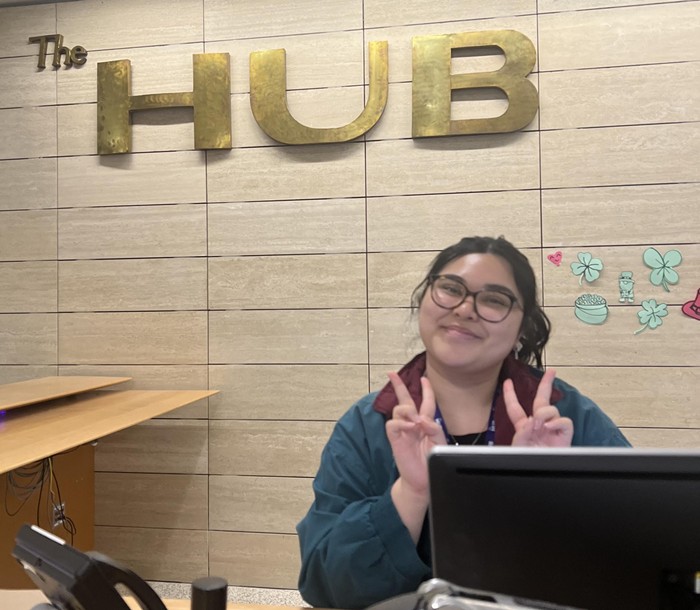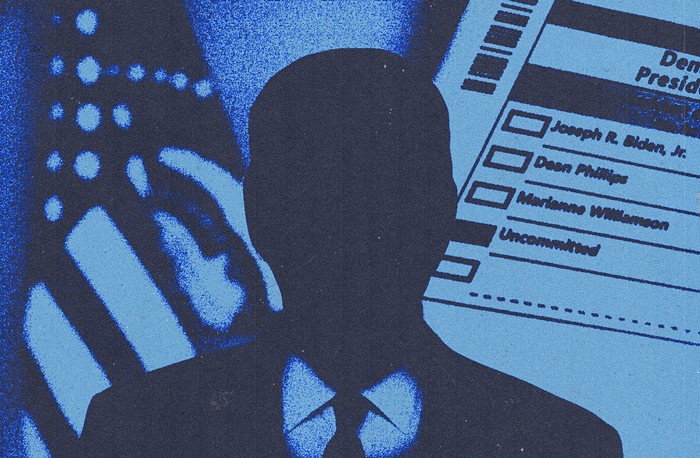On the last day of voting in Washington’s 2024 presidential primaries, the US response to the war in Palestine and a general distrust of the federal government left some University of Washington students contemplating whether they should vote at all.
An increase in the number of disillusioned, college-aged voters nationwide could spell trouble in the upcoming general election for President Joe Biden, whose 2020 campaign partly relied on support from that demographic. Removing their voices from the political process could also hurt the causes younger voters care about, since politicians elected without their vote may not feel beholden to the cohort’s concerns. In light of all that, local Democratic groups vow to keep trying to engage the age group.
According to the Community Engagement and Leadership Education Center at UW, in 2020 about half of the University of Washington's eligible students aged 18 to 29 voted. That share matched the national average, which represented an 11% increase in participation from 2016.
Once all of Washington’s votes are tallied, we’ll have a better idea of youth participation in this year’s presidential primary, but the mood among some students this political season pointed to dampened spirits.
For Zekeya Idris, a senior at the University of Washington who studies biology, the primary candidates didn’t have the people's interest in mind. She, along with some of her peers, believe Biden and Donald Trump aim only to satisfy the needs of lobbyists as opposed to the citizens they represent.
“[National] politics is just a bunch of lies, tricks, and schemes,” Idris said. “When they give their speeches, it all sounds nice, but when it comes to making policies, making changes, or supporting individual communities, then they turn a blind eye.”
Idris said she was heavily involved in the previous presidential election, but her passion for civic participation cooled after seeing the Biden Administration's response to Gaza.
“Do you see what’s happening in the world right now,” Idris said. “Anyone with a heart, anyone with an actual brain, or any ounce of empathy could never do any of the things that political leaders are doing.”
Idris said voting for either of the two candidates represented a dead end. She’s not planning to vote in the primaries or in this upcoming presidential election, and she has removed herself from national political participation. In her eyes, voting in local elections for officials that are active in their community will make more of a difference, so she’ll do that instead.
UW student Jamila Abdala was also not registered or planning to vote in the primary election.
“My relationship with American politics… I don’t really have a relationship,” Abdala said. “I kinda see whatever’s posted on social media here and there.”
Washington’s primary elections fell on finals week for UW students, resulting in many neglecting their ballots for studies.
Huy Mai, a 20-year-old engineering student, was too busy to vote in the primaries but is planning on voting at the upcoming presidential elections; he is unaware where his vote lies currently.

Zareenah Umboh, a 20-year-old pre-nursing student, forgot to vote in the primaries but plans to cast her ballot for Biden come November. She believes our government needs to change its priorities to match those of young adults. “Even though our voices are getting stronger, nothing is happening. [The government] just doesn't listen. [They are] not in favor of the youth.”
While not registered currently, Meemi Asumciom, an 18-year-old psychology student, is planning on voting for Biden in November, but she’s not in love with her choices. “Right now I am just really upset at the government. [The war in the middle east] is hard to look at and not be fazed. After Roe v. Wade, I became far removed from [American politics]. Now they're doing a TikTok ban… don't you have better things to worry about?”
In an attempt to reach despondent or disconnected voters, national and local advocates launched a campaign urging voters to fill in the “uncommitted delegates” bubble on their ballot to pressure Biden to call for a permanent ceasefire in Gaza. The protest vote aimed to send the message that we won’t be complicit in genocide.
Sophia Palmer, a law, societies, and justice student, planned on voting uncommitted at the primaries.
In the upcoming presidential elections, Palmer feels more aligned with the ideals of the Democratic Party, and she believes Biden is the lesser of two evils.
International students at UW make up 16% of the student body, and although that excludes them from participation, it doesn't exclude their convictions.
Alice Kim, a 19-year-old cinema and media studies student, is a Korean citizen, so she was unable to vote. Still, she felt as if a weight had been lifted off her shoulders. “I really don’t like Biden or Trump. Even before the peak of Israel and Palestine, I’ve always seen America side with Israel. It never changed, it just confirmed it.”
Stuck between a rock and a hard place, UW students were either voting reluctantly or not at all. That ennui seemed to be reflected in the primary totals.
Biden is currently winning Washington’s Democratic primary with 84% of the vote share. The uncommitted delegates option has amassed about 9%, or 74,500 votes, which isn’t enough for the party to send delegates to the national convention.
According to an analysis from political consultant Ben Anderstone, in Seattle the uncommitted vote was the highest in diverse neighborhoods populated by young adults: 27% from Rainier Vista, 26% from Yesler Terrace, and 25% from Broadway.
The Uncommitted vote in the Democratic primary was highest in diverse, young neighborhoods. It did best in Rainier Vista (27%), Yesler Terrace (26%), and Broadway (25%). Also high in diverse suburbs: Redmond Ridge (18%), North Redmond (16%), and White Center (13%). #waelex pic.twitter.com/cbobIvuYt8
— Ben Anderstone (@BAnderstone) March 14, 2024
According to Stephen Reed, the director of communications at the Washington State Democratic Party, uncommitted delegates do not pose a threat to Democrats.
“We appreciate that people have different opinions on foreign policy. [Those who voted] uncommitted are welcome to our delegation,” Reed said. “We are the only party that is offering voices in Washington state to speak freely on the war in the Middle East. We are focused on listening to those people and understanding both Muslim and Jewish voices.”
Reed argued that Democrats are working toward lasting peace in Gaza, but the overwhelming majority of the pro-Palestinian movement remain unconvinced of their efforts. That skepticism may be reflected in the latest polling, which shows the President currently 30 points under water with 18 to 39-year-olds.
But amidst the primary elections this week, 15 youth voter groups did endorse Biden’s campaign; an unprecedented number of youth organizations backing a presidential ticket, according to Students for Biden-Harris.
Reed believes college-aged voters represent untapped potential and should get involved right when they turn 18. “Youth voters are more important than ever. The seasoned election officials don't have the same viewpoint as youth voters. It's important [the youth] get engaged to change the process.”
Chairman Shasti Conrad was invited to speak at Federal Way High School later this week during a get-out-the-vote assembly, a nonpartisan event to get people to vote and have their voices be heard, and Reed said the party wants to do more of that sort of thing to increase engagement.
While a push for civic engagement seems advantageous, the number of Palestinains that are suffering with the support of US tax dollars is only growing. With the uncommitted delegate protest vote falling short, young voters may see a threat to stay home in November as the only thing that will make President Biden move their way.
Reach reporter Saida Nor at X: @saidaxnor



















